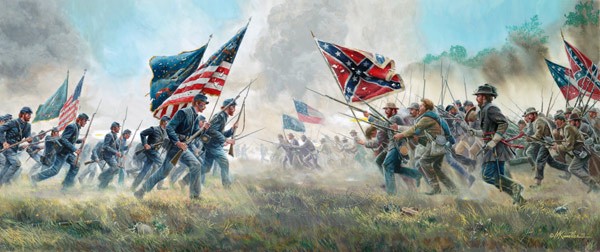The Volokh Conspiracy
Mostly law professors | Sometimes contrarian | Often libertarian | Always independent
No, We're Not on the Brink of Civil War. But the Reasons Why We're Not Are Far From Entirely Reassuring.
Contrary to the fears of some pundits, the U.S. is not on the brink of civil war. But the explanation for that is far from entirely reassuring.

The deeply polarized and highly partisan tone of recent politics has led some pundits to fear that we may be on the brink of another civil war. In reality, any such conflict is highly unlikely. But the reasons why are far from fully reassuring. Political scientist Morris Fiorina, a leading expert on American public opinion, has an excellent article explaining why the "brink of civil war" meme is greatly exaggerated:
Recent articles here and here by Victor Davis Hanson—my colleague at the Hoover Institution--paint a frightening picture of the United States as a country teetering on the edge of civil war….. I am happy to report that the available data provide grounds for feeling much more sanguine about the state of our country. Although they are noisy and harmful to our politics, the kinds of people Hanson criticizes are many fewer in number than generally believed. They are what political scientists call the political class, a small minority of self-appointed activists, demonstrators, donors, partisan media commentators and office-seekers. Given that such people are the public face of politics, many Americans understandably take them as representative, but they are statistically abnormal—what we call "outliers."
To understand contemporary American political life, you should begin with the realization that most of the people blabbering on cable television, venting on Facebook, and/or fulminating on Twitter are abnormal. They are abnormally interested and involved in politics, they tend to occupy the policy extremes, and they are abnormally opinionated… Consider some numbers. As of today, there are about 235 million eligible voters in the United States. About one percent of them subscribe to either The New York Times or The Wall Street Journal. Liberals rail against Fox News and conservatives against MSNBC; they should take consolation in the fact that the Fox viewing audience is about one percent of the eligible electorate while news shows on MSNBC fall short of that. Sean Hannity's is the highest-rated political show on cable television with an audience of about 1.5 percent of the eligible electorate. On the other end of the spectrum Rachel Maddow gets a bit over one percent. Anderson Cooper 360 draws in a paltry 0.4 of one percent. Granted, these small audiences may spread the word to some non-subscribers and non-viewers, but even taking such second-order effects into account, the simple fact is that the ranks of the politically interested are surprisingly thin.
Fiorina goes on to point out (correctly) that most Americans do not align with the ideological extremes of either party, and that the self-described distribution of liberals, moderates, and conservatives has changed very little over the last few decades. He is also right to emphasize that the kinds of people who avidly follow political news (and the kinds who tend to read blog posts like this one!) are highly unrepresentative. Fiorina could have added that the actual rate of domestic political violence in America today is still much lower than that of the 1960s, when both far-right and far-left groups engaged in it on a far larger scale than anything we have seen in recent years. Yet we did not come close to civil war back then, either.
The reasons for optimism about a potential civil war are far from reassuring when it comes to their implications for other aspects of American politics, however. As Fiorina emphasizes, the biggest factor tamping down war fever is that most Americans simply aren't that interested in politics, and don't follow it closely. This is actually rational behavior for most voters: if your only reason to keep track of government and public policy is to be a better voter, that's not much of an incentive to do so, since the chance your vote will make a different to the outcome of an election is extremely small. Widespread political ignorance of this kind reduces the quality of government policy, and renders voters vulnerable to deception and demagoguery, of the sort that we often see on both right and left. The dangers of this kind of ignorance are exacerbated by the enormous size, scope, and complexity of modern government, which make it difficult for rationally ignorant voters to effectively monitor more than a small fraction of its activities.
The small minority of activists that Fiorina refers to are generally much better-informed than the average voter. But they also tend to be highly biased in their evaluation of political information. Instead of acting as truth-seekers, most behave as loyal "political fans" of Team Red or Team Blue, overvaluing anything that supports their preexisting views, and discounting anything that cuts against them. This kind of bias has been on full display in recent days, when commentators' opinions on the veracity of the sexual assault accusations against Supreme Court nominee Brett Kavanaugh has been closely correlated with their general political alignment. Such "motivated reasoning" is particularly common in an era when (as Fiorina recognizes) the two parties are more polarized than in the past, and partisan hatred is unusually high.
Biased activists/political fans are unlikely to cause a new civil war. But they do wield political influence disproportionate to their numbers. That further reduces both the quality of political discourse, and the quality of the policies advocated by both major parties. We should be happy that a second Civil War is unlikely to break out anytime soon. But there is much less cause for celebration when it comes to the overall state of American democracy.


Show Comments (145)